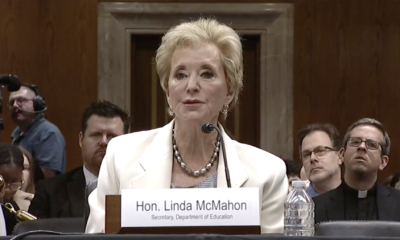crime
22-Year-Old Chosen by Trump’s Team to Spearhead Terrorism Prevention Efforts

Thomas Fugate, a recent college graduate, has become a significant yet controversial figure within the Department of Homeland Security. Just a year after earning his degree in politics from the University of Texas at San Antonio, the 22-year-old now oversees the community’s response to terrorism as part of the government’s main terrorism prevention hub, known as CP3. His rapid ascent raises questions about competence and experience in a critical role.
Appointed by the White House, Fugate’s background includes working on the Trump campaign and interning at the conservative Heritage Foundation. Criticism of his appointment has arisen within counterterrorism circles, particularly due to his lack of relevant experience. Experts in the field, who typically expect candidates for such positions to have extensive backgrounds, expressed concern over the decision, citing that Fugate’s leadership experience primarily stems from his role as secretary general of a Model United Nations club.
Recent violent attacks, including a car bombing in California and a shooting of Israeli Embassy aides in Washington, underline the urgency of the department’s mission. Currently, with a staggering drop in staff—from approximately 80 employees to fewer than 20—CP3’s efficacy has come into question. Many former personnel feel the mission has shifted dramatically, moving away from addressing domestic extremism towards a focus on immigration and border security.
Citing deep cuts to public health initiatives and violence prevention efforts, critics label the current conditions within Homeland Security as “reckless.” This restructuring raises alarm, especially against a backdrop of increased targeted violence in the United States. Inadequately staffed and seemingly unfocused, CP3 now faces an uphill battle in violence prevention.
The White House defends Fugate’s appointment, asserting that his role has expanded due to his success and proven work ethic. An official spokesperson emphasized that the office’s responsibilities are broader than just counterterrorism and that partnerships with local law enforcement remain strong. However, skepticism remains among those familiar with CP3 operations.
Fugate’s swift rise is seen by some as a political maneuver rather than a strategic decision aimed at enhancing national security. Two predominant theories surrounding his appointment suggest that he may either represent a generational reward for loyalty to Trump or serve as a placeholder for a department pivoting away from traditional counterterrorism efforts.
Following a series of attacks throughout the spring, the fear is mounting that extremism could surge amidst worsening political tensions. Observers worry that the diminished focus and resources for terrorism prevention could lead to further violence as the nation prepares for a potentially volatile summer.
Meanwhile, while Fugate’s recent actions suggest a continuation of funding initiatives, proposals for the next fiscal year reflect an intention to eliminate the threat-prevention grant program altogether. This decision has raised eyebrows among those who advocate for strengthening counterterrorism efforts. The overarching message from the department appears to signal a retreat from prioritizing terrorism prevention within the national security agenda.


















